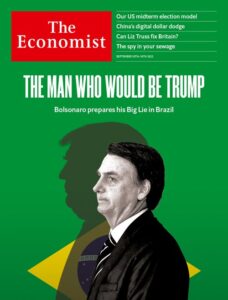Leftist former President Luiz Inácio Lula da Silva, commonly known as Lula, won Brazil’s presidential runoff yesterday, defeating incumbent Jair Bolsonaro by less than two percentage points, Reuters reports (HT: CFR). Brazil’s race was closely watched, internationally due to Bolsonaro’s attempts to sow doubt in the country’s electoral system, AP adds.
The results on Sunday showed that tens of millions of Brazilians had grown tired of Bolsanaro’s polarizing style and the frequent turmoil of his administration, the Times reports. It was the first time an incumbent president failed to win re-election in the 34 years of Brazil’s modern democracy.
 But Lula may not be a straightforward ally for Western leaders when it comes to the major foreign policy challenge of the day: the war in Ukraine. In an interview with TIME in March, the leftist leader criticized both U.S. President Joe Biden and Ukraine’s Volodymyr Zelensky for failing to negotiate with Russia’s Vladimir Putin before war broke out, TIME reports:
But Lula may not be a straightforward ally for Western leaders when it comes to the major foreign policy challenge of the day: the war in Ukraine. In an interview with TIME in March, the leftist leader criticized both U.S. President Joe Biden and Ukraine’s Volodymyr Zelensky for failing to negotiate with Russia’s Vladimir Putin before war broke out, TIME reports:
Lula also told TIME that the international community’s celebration of Zelensky since the war began has been a mistake, calling for a greater focus on behind-the-scenes negotiations. “You are encouraging this guy, and then he thinks he is the cherry on your cake. We should be having a serious conversation. OK, you were a nice comedian. But let us not make war for you to show up on TV.”
A coalition of civil society organizations monitoring voting, expressed concern over allegations of police attempting to suppress the vote in regions supportive of Lula, the Washington Post reports.
 It’s back to the future, the Atlantic Council notes, adding that Lula called the victory a “resurrection”: after he served two terms as president, he spent time in jail for corruption before the conviction was overturned.
It’s back to the future, the Atlantic Council notes, adding that Lula called the victory a “resurrection”: after he served two terms as president, he spent time in jail for corruption before the conviction was overturned.
“It’s Lula, in one of the biggest comebacks in modern political history,” Americas Quarterly’s Brian Winter tweeted. Two years ago he was in prison. Now he’ll get a chance to repeat the magic of his 1st presidency in [the] 2000s—but with a much more difficult global economy, and a VERY divided Brazil.”
National Endowment for Democracy (NED) President and CEO Damon Wilson congratulated Brazilians on their “remarkable democratic engagement.” Nearly 80% of the electorate voted with a slight increase in the second round, he tweeted.
Brazil’s democracy stepped back from the cliff, said analyst Oliver Stuenkel. But while the world waits to hear whether Bolsonaro will accept the result or contest it, as he has often threatened to do, one thing is for certain: this is good news for democracy, he told the BBC.
“Bolsonaro had over the past four years sought to undermine checks and balances and put increasing pressure on the judiciary and civil society,” he says. “In that sense, particularly for other democracies around the world, his victory is unambiguously good news, particularly at a time of democratic regression.”
Other experts downplayed the risk of a power grab by Bolsonaro.

Credit: Wilson Center
“Lula remains likely to begin his term on a moderate note on economic policy, but risks over economic management will grow over time given a short honeymoon and a tough public opinion environment,” said the Eurasia Group. “While the risk of near-term protests remains high, the risk of a serious institutional crisis remains very low,” it said.
“It was a very narrow victory… (that left) half the population unhappy. Lula will have to show a lot of political skill to pacify the country,” said political scientist Leandro Consentino of Insper university in Sao Paulo.
“The worst thing that could have happened Sunday was for Brazilians to go to sleep without the president saying anything. It casts doubt over whether he’s going to accept the result,” he told AFP.
Lula ultimately secured 50.9 percent of the vote, while Bolsonaro received 49.1 percent—making it Brazil’s tightest presidential contest since 1985, when the country transitioned from a military dictatorship to democracy, Foreign Policy adds.
“The huge challenge that Lula has will be to pacify the country,” said political analyst Thomas Traumann. “People are not only polarized on political matters, but also have different values, identity and opinions. What’s more, they don’t care what the other side’s values, identities and opinions are,” he told POLITICO.







